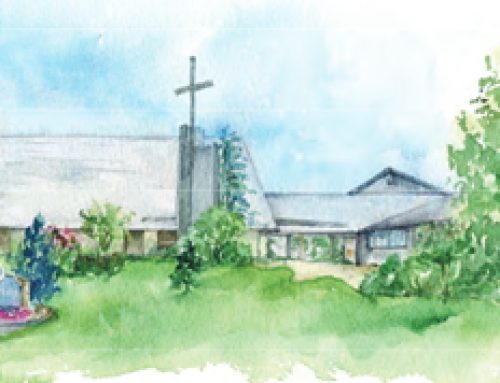FROM THE PASTOR’S DESK
My Dear Parishioners:
Grief comes boxed in many different packages. The death of a loved one, a routine visit to the doctor reveals a fatal disease, the end of a marriage, a heart broken by betrayal, a young person caught up in drugs, the untimely death of a pet, job loss; the list goes on and on, and the consequent anguish comes in all shapes and sizes. And how we grieve is unique to every human being as well. Some of us share our grief with friends and family members while others stoically hide their agony. One woman abandoned by her spouse cries for days; another masks her suffering and carries on her duties as a banker
and mother.
Meanwhile, people attempting to console the afflicted are often at a loss of words to say or do. Some offer awkward or inappropriate consolation because they feel the need to say something. Conversely, some say nothing, preventing from reaching out after a funeral or some other catastrophe because of feelings of inadequacy and fear.
Many public libraries have book titles such as “A Woman’s Book of Grieving” and “You can Help Someone Who’s Grieving: A How-To Healing Handbook.” These guides I am sure are helpful, but here I offer my own observations on grief and healing, and how to help the grief-stricken. I too, have witnessed and experienced my share of sorrow and heartache.
Take time to feel the pain. Six weeks after my younger sister’s death, one of my friends said to me, “You need to get over this and move on.” I replied, “I will move on. But right now, I’m going to go on missing Michele.” We need to allow ourselves to grieve and work our way through the sorrow. None of us enjoys suffering, but such a loss demands we feel the pain and allow that great healer, time to do its work. A therapist once told me that grief over the loss of a loved one can take up to three years before healing finally comes. So be patient with yourself and with those around you. Grief does not come with a timetable.
Presence is all. By presence I mean both the presence of those who are directly afflicted and the presence of those who are caring for them. Some of us who are hurting from a loss, or a betrayal are tempted to remove ourselves from our suffering. I’ve known men and women who went on shopping binges, spending money to keep the pain at bay. Others may turn to drugs or alcohol, throw themselves into work or seek diversion in games like tennis or golf. And those who want to help grieving friends and family members should know this: your presence means more than meals, money or words. Being there with the person, preferably physically, is the best gift you can give. A hug at a time like that means more than you may image imagine.
Grief changes us. We may hug a little longer, may well up with tears when we see a movie or eat at a favorite restaurant that a loved one enjoyed. That is alright. Loss and grief leave some people bitter or cynical, unable to see the good in their lives and in the world. If we pay close attention, however, grief is a great teacher. It can deepen our empathy and love for others, it eventually gives us the power to cherish those we have lost, and even allows us to learn from those who have wronged us—the spouse who abandoned the marriage, the dead mother who wounded us, the business partner who brought us to financial ruin. Kate McGahan, author and hospice counselor, once wrote, “Grief will not let you go until you satisfy what it came to teach you.”
I hope this letter brings some hope to those who are in pain from loss.
Peace,
Fr. Monteleone
To read complete bulletin click here



